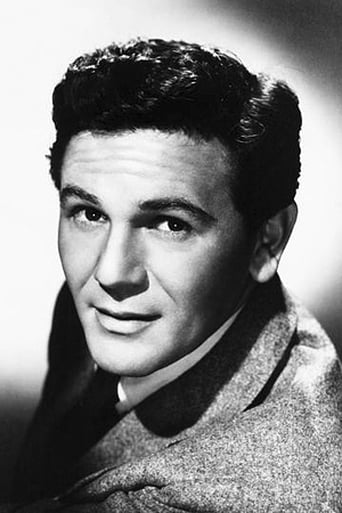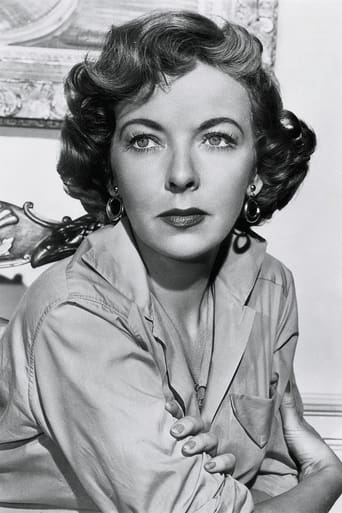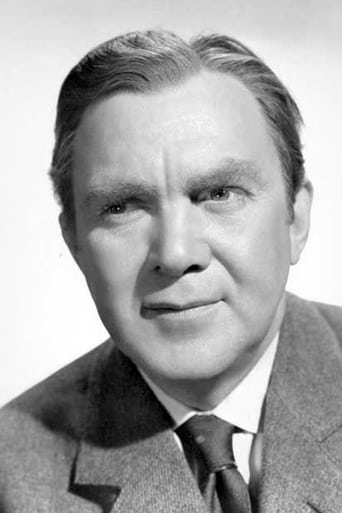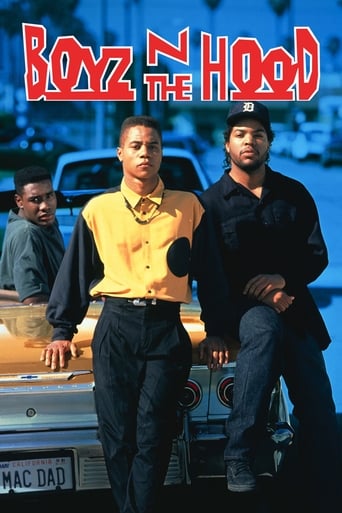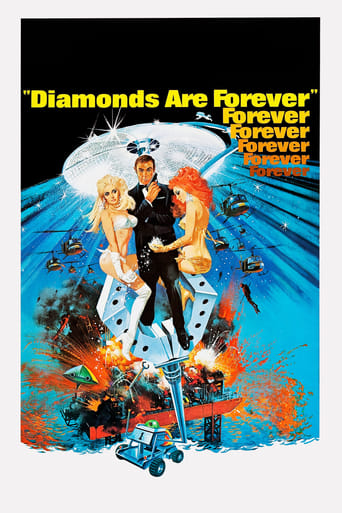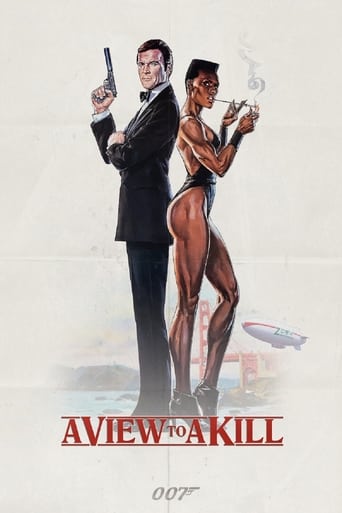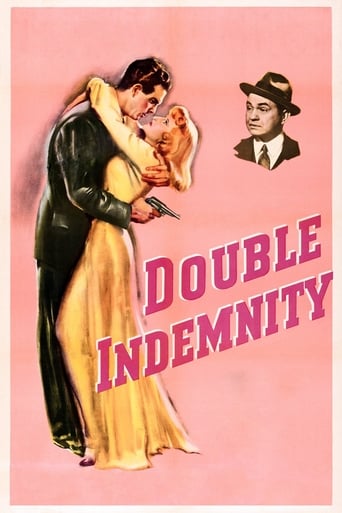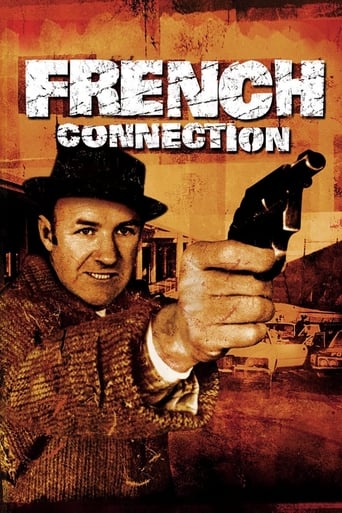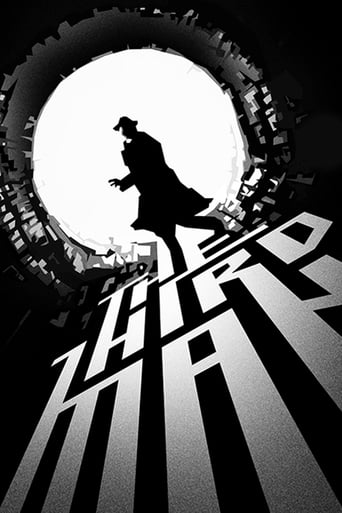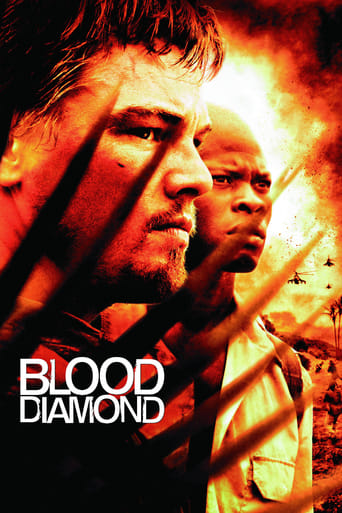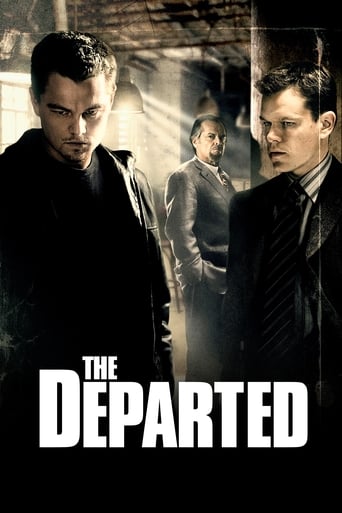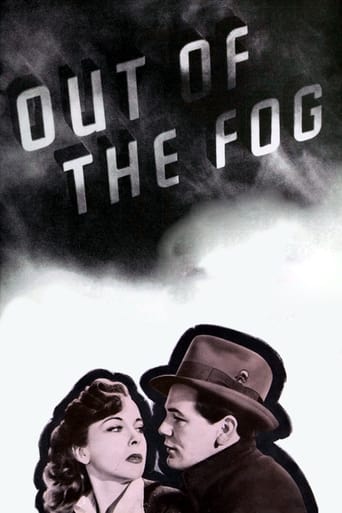
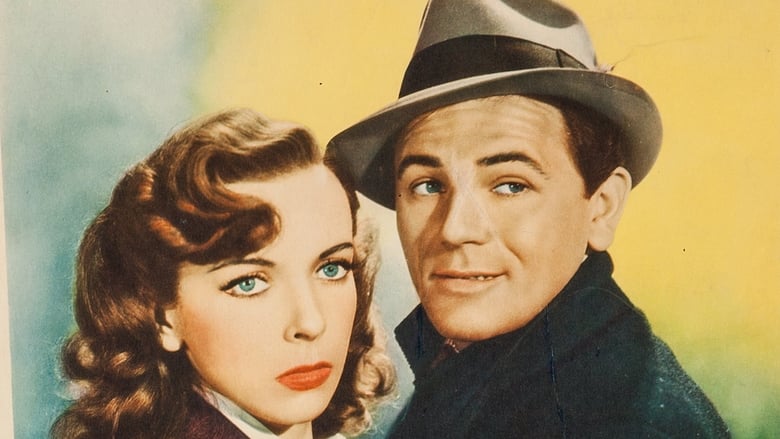
Out of the Fog (1941)
A Brooklyn pier racketeer bullies boat-owners into paying protection money but two fed-up fishermen decide to eliminate the gangster themselves rather than complain to the police.
Watch Trailer
Cast


Similar titles
Reviews
Good movie, but best of all time? Hardly . . .
Good movie but grossly overrated
It’s fine. It's literally the definition of a fine movie. You’ve seen it before, you know every beat and outcome before the characters even do. Only question is how much escapism you’re looking for.
An old-fashioned movie made with new-fashioned finesse.
Out of the Fog is directed by Anatole Litvak and collectively adapted to screenplay by Robert Macaulay, Robert Rosen and Jerry Wald from the play The Gentle People written by Irwin Shaw. It stars John Garfield, Ida Lupino, Thomas Mitchell, John Qualen and Eddie Albert. Music is by Heinz Roemheld and cinematography by James Wong Howe. The Brooklyn wharf-side is the setting for this melodrama tinted with noirish themes and players. The area is Sheepshead Bay and the local citizens are a gathering of people stuck in a rut they seem incapable of getting out of. Old gentlemen dreamers planning to buy a big boat and sail off to sunnier climes, the local lovely who's in a dull relationship with a dullard – who craves for something more spicy. Other patrons of Sheepshead just while away the hours playing cards in the local restaurant - that's the peak of their excitement, and others are just slaves to the grindstone. Then there's Jacob Goff (Garfield), a chiseller and racketeer, a man who stomps around the wharf like the cock of the hen-house, gathering protection money or casually setting fire to the boats of anyone who dares not to pay their dues There's a wonderfully atmospheric feel to Out of the Fog, due to the claustrophobic setting of the story and Wong Howe's moody photography. Characterisations are enhanced by some well versed scripting that puts lyrical dialogue into the mouths of the principal players. Goff is the archetypal charming rogue, with a killer smile and sexy danger oozing from his pores, it's no wonder that frustrated Stella Goodwin (Lupino) spies an opportunity to escape her humdrum existence. Hell! Goff even does card tricks. But of course he is a sort of devil in disguise, or fascism in disguise as it happens, and as he tips the lives upside down of the Sheepshead residents, it brings threats and violence to this once quiet little waterfront. 1941 was a key year for film noir, with the likes of The Maltese Falcon and I Wake Up Screaming lighting the touch paper of a film making style that would burn brightly for the next 20 years. Out of the Fog has made its may into some noir publications, which is understandable given the essence of the story and the presence of noir legends Lupino and Garfield, but it's not what I would call essential film noir by some margin. However, it's a comfortable recommendation to like minded noirphiles regardless. 7/10
Two poor Sheepshead Bay fisherman (Thomas Mitchell and John Qualen) become the victims of a seemingly charming (but really ruthless and violent) racketeer (John Garfield) who demands protection money. As they fall prey to his threats, he gets more demanding, and when he begins to ensnare Mitchell's daughter (Ida Lupino), papa gets fed up. At Mitchell's urging, he and Qualen have Garfield arrested for extortion, but a technicality gets him off and Mitchell is brutally beaten with a rubber hose. Mitchell convinces Qualen that they need to knock Garfield off to get out from under his skin and to protect his daughter. Of course, things don't go as planned and Lupino's old boyfriend (Eddie Albert) is implicated in his murder.Garfield and Lupino are top billed, but is Mitchell and Qualen whom the story focuses on and are deserving of the acting honors. All of the sympathy lies with them because they are the victims of evil, and Lupino's heroine seems to willingly fall under Garfield's spell. Aline MacMahon and Odette Myrtil are the somewhat domineering women in their lives, although MacMahon appears only briefly which is sad considering her popularity at Warners less than 10 years before. Albert only has minor importance, even though he's an important part of the storyline. As a young male character, he's no match for Garfield's determination to manipulate and control everybody around him to achieve his own evil goal.This is a very unique crime drama because it is about the victims of crime fighting back rather than the law. When Mitchell and Qualen begin plotting their revenge, the audience can't help but hope they succeed. Garfield's villain is his most ruthless, sort of a modern day Bill Sikes who enjoys making money at other's expenses. In small roles, Bowery Boy Leo Gorcey and his father Bernard, as well as "Bewitched's" George Tobias, offer amusing color of the Brooklyn neighborhood. This is a good chance to see Leo Gorcey giving an admirable performance, because rather than playing the over-aged teenager, he's actually acting his real age for a change.Anatole Livak's direction is as crisp as the waterfront scenery and excellent photography that is downright moody at times. While some Warner Brothers street films often fall into the same archetype, "Out of the Fog" is very different and offers a fresh perspective on an all too familiar story.
Racketeer Goff extorts money from small boat owners like Jonah and Olaf, while romancing Jonah's daughter! With an equation like this, something's got to give.The movie's very much a product of the leftish 1930's. Note the way it lavishes praise on "ordinary" people, and how happiness is seen as coming to accept one's own ordinariness. Note also the words the vicious Goff is made to say— phrases like "superior people" and "only the strong" surviving. Clearly, Goff amounts to an enemy of ordinary people, and on the eve of WWII, that amounts to a stand-in for fascism. In fact, the movie itself amounts to an allegory of a fascist movement (Goff) that by 1941 had conquered much of Europe, holding its ordinary people either in thrall (Stella) or in fear (Jonah & Olaf).Now, there's nothing wrong with a sub-text like this, except the movie's pretty stagey (a single sound-stage set) and the characters one-dimensional, likely an unfortunate result of the allegorical sub-text. Anyway, there are helpful deposits of humor from the Jewish characters that apparently retains some flavor of the original play. However, the screenplay really cops out by having "God", instead of Goff's victims, take care of the oppressor. In fact, Olaf is made so meek and submissive he's almost craven and unworthy of his dreams. But, I suspect the writers were up against a Production Code that would insist on punishing the two fishermen had they gone through with their plan. Thus God is called in to do the job instead. To me, however, carrying through the plan would have shown that the oppressed can rise up and free themselves without metaphysical assistance, a valuable lesson, I believe, Code or no Code. All in all, the film remains very much a Hollywood adaptation of a much grittier New York play (IMDB Trivia), and a disappointment considering the talent involved.
I found this movie painful to watch. Jack Warner should have been ashamed to release it quite frankly. I love John Garfield, Ida Lupino and the others as actors but Anatole Litvak, the director, went seriously off the rails with this one. He really should have reigned in John Garfield a little.Indeed, John Garfield's character of Goff is so one-dimensionally nasty that you can't but cheer when he gets his come-uppance (as the movie code would have demanded). Ida Lupino was so stupidly infatuated with him, even knowing the racketeer was harassing her father, that one can only hold her in contempt. Qualen is so spineless and MacMahon is so loud and off-putting (her character yes, but over the top!) that I could barely stand it. And the cops and judge...no wonder people make jokes about them! The only lights I could find in this movie were Thomas Mitchell's character of Jonah and to a lesser extent Eddie Albert's character of George. They save the movie from total disaster.I wanted to love this movie because I love the actors. Sadly, I can only say I got through it.


